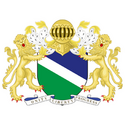New Gough Island
Republic of New Gough Island | |
|---|---|
| Anthem: The Great New Gough Island | |
 | |
| Capital | South Metro |
| Largest District | The Newlands |
| Official languages | Common |
| Recognised regional languages | Gough |
| Ethnic groups (2024) | White (43%) Black (22%) East Asian (15%) Native (10%) Arab (6%) Mixed Race (4%) |
| Religion (2024) | Non Religious (36%) Christan (34%) East Asian Religions (15%) Native Gough Religions (10%) Other (3%) Islam (2%) |
| Demonym(s) | New Gough Islander |
| Government | Unitary Presidential Republic |
• President | Anna Jackson |
• Vice President | James Duncan |
| Legislature | National Assembly |
| State Council | |
| House of Commons | |
| Establishment | |
• Arrival of the First Colonists | 1609 |
• Independence | 1901 |
| Area | |
• | 1,836.94 sq mi (4,757.7 km2) |
| Population | |
• 2024 census | 1,098,000 |
• Density | 597.73/sq mi (230.8/km2) |
| GDP (nominal) | 2024 estimate |
• Total | ACU 30.744 Billion |
• Per capita | ACU 28,000 |
| Gini (2024) | 34.6 medium |
| HDI (2024) | very high |
| Currency | New Gough island Glider (NGIG) |
| Time zone | New Gough Island Time |
| Date format | mm/dd/yyyy |
| Driving side | left |
| Calling code | +53 |
| Internet TLD | .ng |
New Gough Island officially the State of New Gough Island or less commonly known, The New Gough Island City is a country in the southern hemisphere. The country is made up of a large island and a smaller island. As of the 2024 census, the nation's population stood at 1.098 million. The country has a land area of 1,836.94 sq mi. The capital district is South Metro. While the largest is The Newlands. The majority of the country's population lives on the highly urbanized South New Gough Island. While the North New Gough Island is highly mountainous and forested. The climate of the country is tropical monsoonal, with a highland subtropical climate in the mountains of the north island.
History
Demographics
| Historical population | ||
|---|---|---|
| Year | Pop. | ±% |
| 1730 | 10,000 | — |
| 1750 | 28,000 | +180.0% |
| 1800 | 80,000 | +185.7% |
| 1820 | 154,000 | +92.5% |
| 1850 | 224,000 | +45.5% |
| 1870 | 297,000 | +32.6% |
| 1880 | 383,000 | +29.0% |
| 1890 | 448,000 | +17.0% |
| 1900 | 581,000 | +29.7% |
| 1910 | 654,000 | +12.6% |
| 1920 | 737,000 | +12.7% |
| 1930 | 812,000 | +10.2% |
| 1940 | 864,000 | +6.4% |
| 1950 | 903,000 | +4.5% |
| 1960 | 961,000 | +6.4% |
| 1970 | 1,008,000 | +4.9% |
| 1980 | 998,000 | −1.0% |
| 1990 | 959,000 | −3.9% |
| 2000 | 984,000 | +2.6% |
| 2010 | 1,010,000 | +2.6% |
| 2020 | 1,052,000 | +4.2% |
| 2024 | 1,098,000 | +4.4% |
Geography
Climate
Lua error in Module:Navbar at line 58: Invalid title .
Administrative Divisions
Districts
| District | Population 2010 | Population 2020 | Population Estimate 2024 | Population Change | Land Area | Population Density | Number of Neighborhoods |
|---|---|---|---|---|---|---|---|
| South Metro | 51,000 | 88,000 | 100,000 | +12% | 15 sq mi (39 km2) | 6,667 people per sq mi (2,564.1 people per sq km) | 5 |
| Old Flatiron | 334,000 | 291,000 | 280,000 | -3.8% | 40 sq mi (100 km2) | 7,000 people per sq mi (2,800 people per sq km) | 10 |
| Star Hills | 95,000 | 110,000 | 130,000 | +15.4% | 55.84 sq mi (144.6 km2) | 2,328.1 people per sq mi (899 people per sq km) | 8 |
| Old Gough City | 165,000 | 144,000 | 132,000 | -8.33% | 10 sq mi (26 km2) | 13,200 people per sq mi (5,076.9 people per sq km) | 4 |
| The Newlands | 272,000 | 337,000 | 383,000 | +12.1% | 120.85 sq mi (313.0 km2) | 3,169.2 people per sq mi (1,223.6 people per sq km) | 12 |
| North New Gough Island Wildlands | 78,000 | 70,000 | 63,000 | -10% | 1,353.55 sq mi (3,505.7 km2) | 46.5 people per sq mi (18 people per sq km) | 5 |
| South New Gough Island Wildlands | 15,000 | 12,000 | 10,000 | -16.34% | 241.7 sq mi (626 km2) | 41.4 people per sq mi (16 people per sq km) | 3 |
Government
Politics
Supreme Court
National Assembly
President and Cabinet
Transportation
Education
Economy

